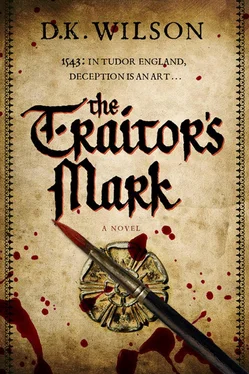D. Wilson - The Traitor’s Mark
Здесь есть возможность читать онлайн «D. Wilson - The Traitor’s Mark» весь текст электронной книги совершенно бесплатно (целиком полную версию без сокращений). В некоторых случаях можно слушать аудио, скачать через торрент в формате fb2 и присутствует краткое содержание. Год выпуска: 0101, Издательство: Pegasus Books, Жанр: Исторический детектив, на английском языке. Описание произведения, (предисловие) а так же отзывы посетителей доступны на портале библиотеки ЛибКат.
- Название:The Traitor’s Mark
- Автор:
- Издательство:Pegasus Books
- Жанр:
- Год:0101
- ISBN:нет данных
- Рейтинг книги:5 / 5. Голосов: 1
-
Избранное:Добавить в избранное
- Отзывы:
-
Ваша оценка:
- 100
- 1
- 2
- 3
- 4
- 5
The Traitor’s Mark: краткое содержание, описание и аннотация
Предлагаем к чтению аннотацию, описание, краткое содержание или предисловие (зависит от того, что написал сам автор книги «The Traitor’s Mark»). Если вы не нашли необходимую информацию о книге — напишите в комментариях, мы постараемся отыскать её.
The Traitor’s Mark — читать онлайн бесплатно полную книгу (весь текст) целиком
Ниже представлен текст книги, разбитый по страницам. Система сохранения места последней прочитанной страницы, позволяет с удобством читать онлайн бесплатно книгу «The Traitor’s Mark», без необходимости каждый раз заново искать на чём Вы остановились. Поставьте закладку, и сможете в любой момент перейти на страницу, на которой закончили чтение.
Интервал:
Закладка:
‘You’d think Sir Thomas would know we have better things to do,’ Thwaites grumbled. ‘I’ve never known the country so unstable, not even at the time the monasteries were being pulled down. The more troublemakers I hang, the more are lining up to take their places.’
‘I believe the archbishop is hoping our commission will ensure that preachers stick to official doctrine. That ought to make our job easier.’
‘Hypocrite!’ Thwaites exploded in cynical laughter. ‘Cranmer’s the biggest heretic in England!’
‘That is foolish talk,’ James protested. ‘I’ve heard slackbrained ploughmen say that sort of thing after four jars of ale, but Cranmer speaks for the king and has the backing of parliament.’ .
‘For the moment,’ Thwaites muttered.
‘What do you mean by that?’ I asked.
‘No matter.’ Thwaites waved a hand. ‘All I know is that most of the pulpit pounders and Bible bashers round here claim to have Cranmer’s support. Let me tell you about the worst of the brood. He’s a snivelling little rabble rouser called Richard Turner, Vicar of Chartham, and he’s been rampaging around these parts for the last couple of years. He preaches inside the churches and out. He stirs young men to all sorts of vandalism. My grandfather left money – a lot of money – in his will for a statue of the Virgin for Chilham Church. Three months ago, one of Turner’s mobs hauled it down – sacrilegious, degenerate traitors! Don’t tell me his majesty sanctions that sort of behaviour!’ Thwaites’s face was red with fury.
‘You have the power to arrest such villains,’ James observed mildly.
‘Aye, and there’s the point of it. Twice I’ve had Turner clapped in jail and sent him up to the archbishop’s court. What happened? His grace says he “finds no fault” in the man. So Turner goes on his way, bolder than before. Well, this time I have him. He’s in irons waiting to go before the assize judges at Michaelmas. Cranmer won’t rescue him from the gallows this time.’
‘That was well done, Edward,’ I said. ‘I trust you are as hard on gangs who are paid by papistical bishops to go around maiming and killing folk not of their faith.’
‘What do you mean by that?’ the old man asked.
‘No matter,’ I replied, with a wave of my hand.
Eastwell Court was as impressive as popular rumour had led me to expect. The original courtyard had been extended westwards and a large workforce was occupied in erecting a balancing range of buildings to the east. Sir Thomas received us in his great hall where several guests were already assembled and were talking in small groups. Everything about Moyle impressed and was meant to impress. He wore a doublet of grey silk with a gold chain stretched across his ample stomach. He shook hands and shared a few words with each newcomer in turn. He clearly enjoyed holding court and was well practised at it. Having received his words of greeting, I moved towards the fire-place, before which a small group were engaged in debates.
‘Bishop Gardiner says he would give six thousand pounds to pluck down the archbishop. I have that on good authority from a friend on the Privy Council.’ The speaker was an austere man with lank black hair. I immediately recognised Sir Anthony St Leger of Ulcombe, a man high in the king’s confidence and but recently returned from acting as viceroy in Ireland. I joined his group.
‘How does Gardiner intend to achieve that, do you think?’ I asked.
‘Oh, I keep clear of religious infighting,’ St Leger replied. ‘I leave that sort of thing to my brother, Arthur. He’s a prebendary at Canterbury.’
Someone else said, ‘I gather all the prebendaries and senior clergy at Canterbury heartily wish to be rid of Cranmer.’
‘But again I ask, how are they going to do it?’ I persisted. ‘Brave talk is easy but I understand that Cranmer stands very high in his majesty’s affections.’
‘I agree with Thomas.’ Peter Flett, from Hadstead, near Tonbridge, like me, was one of the younger members of the gathering. ‘When there was all that trouble at Windsor, a few weeks back, everyone was saying that the archbishop would be caught up in it, but nothing has happened.’
‘As far as you know,’ St Leger suggested. ‘It matters not what “everyone” is saying; ’tis what is being said and plotted in secret that is important. When Cromwell was brought down who could have foretold it? For all the world knew, he stood high in his majesty’s affections. Yet, within a few hours, the upstart’s reign was over. My guess is that it will be the same with Cranmer. He is much unloved by people who matter. They will not suffer him to remain at the king’s right hand much longer. Anyone who is wise will be careful not to get too close to our dear archbishop. When ships sink, little boats can get caught in their wake and founder also.’
At that moment, a bell sounded and we were called to dinner. This had been laid out on a long table in the upper part of the hall. As the company took their seats, I had the distinct impression that they were dividing into two sections. St Leger, Thwaites and others of a similar disposition seemed to be settling around the right end of the table. Those who might be considered to be well disposed to Cranmer occupied the other end. Moyle, of course, took his place in the centre, facing down the hall. He was backed by a huge tapestry of some allegorical scene. On his right was a man wearing a clerk’s gown. I was careful to fill one of the gaps almost opposite our host. If he wanted to gauge my allegiance I would not make it easy for him.
The dinner was impressive – at least seven messes – and Moyle seemed in no hurry to conclude it and bring us to our business. When at length he did so, he spoke in the confident tones of a man well versed in chairing meetings.
‘Gentlemen, I thank you for coming. As you know, we are gathered to consider the best ways we can assist the archbishop in putting an end to religious discord. I have asked his grace’s secretary, Ralph Morice’ – he indicated his neighbour – ‘to be present in order to report on our deliberations to the archbishop in person.’
‘This is a religious matter,’ someone to my right said. ‘Surely the clergy should be dealing with it.’
‘By your leave, Sir Thomas, I’ll answer that.’ Morice, a fair-complexioned man of middle years, directed his gaze up and down the table. ‘This body carries his majesty’s commission as head of the Church. Doctrine, as defined by the king in council with his bishops and parliament, is now enshrined in statute law. The king – and the archbishop – simply require that you enforce the law.’
There were murmurings to my right and left but no one spoke. Moyle resumed control. ‘His majesty has set forth true Christian doctrine in the manual published last May and commonly called the King’s Book.’
‘Are we supposed to commit it all to memory and examine our parish priests on every detail?’ another man wanted to know.
‘Certainly not,’ Moyle assured him. ‘We simply have to make sure the clergy swear to teach from it and from nothing else. If we hear that anyone is preaching something unauthorised, we are to take testimonies and send them with the offenders to the quarter sessions. Once example has been made of a few disobedient clergy, I’ll warrant we shall have little more trouble.’
I don’t think anyone was convinced by Moyle’s assurances but, in the presence of the archbishop’s representative, no one was prepared to give voice to criticism. We spent another half-hour or so exchanging information on possible troublemakers and dividing the county into smaller regional units for more effective united action. In mid-afternoon the meeting was formally closed and members drifted away. Through the windows high in the old walls we could all see the grey-black clouds crawling across the sky and we were anxious to start for home. However, I wanted to have a word in private with our host and lingered by the outer doorway, waiting for an opportunity. It was then that Ralph Morice came across and, taking me by the arm, steered me outside.
Читать дальшеИнтервал:
Закладка:
Похожие книги на «The Traitor’s Mark»
Представляем Вашему вниманию похожие книги на «The Traitor’s Mark» списком для выбора. Мы отобрали схожую по названию и смыслу литературу в надежде предоставить читателям больше вариантов отыскать новые, интересные, ещё непрочитанные произведения.
Обсуждение, отзывы о книге «The Traitor’s Mark» и просто собственные мнения читателей. Оставьте ваши комментарии, напишите, что Вы думаете о произведении, его смысле или главных героях. Укажите что конкретно понравилось, а что нет, и почему Вы так считаете.












